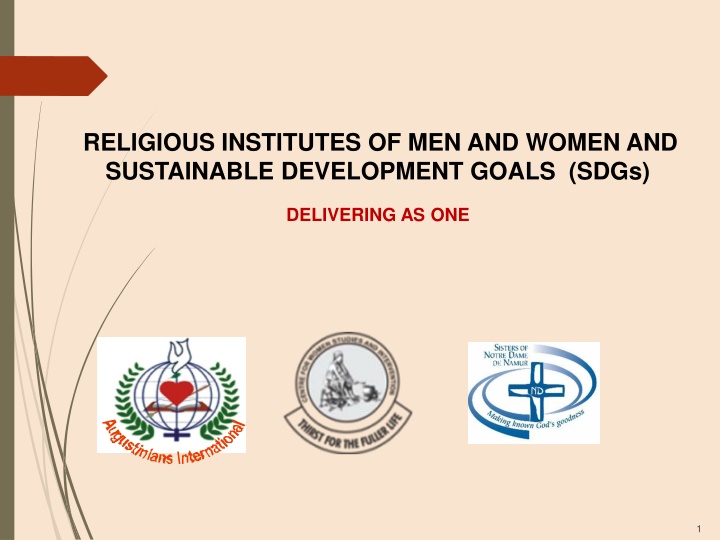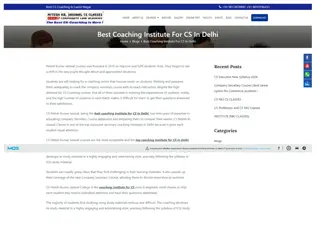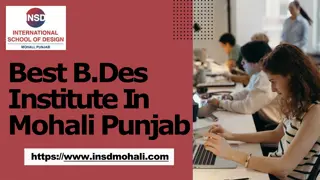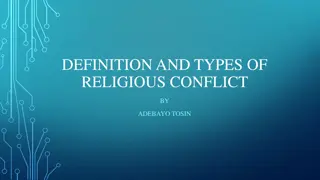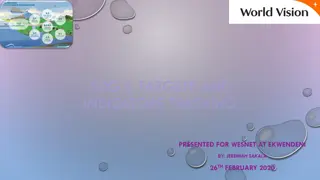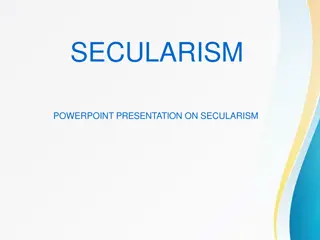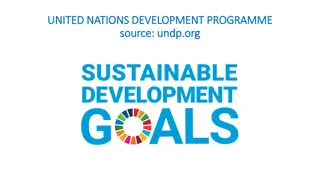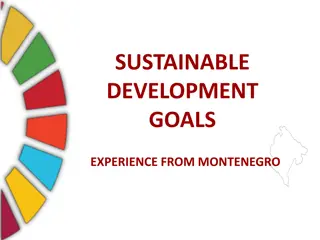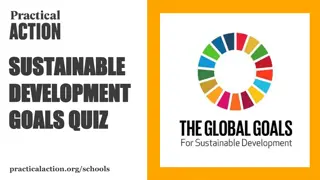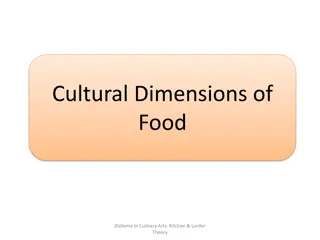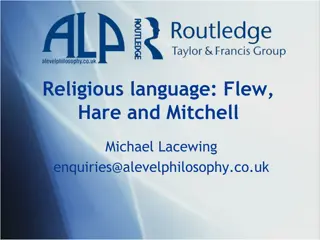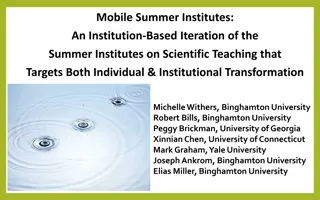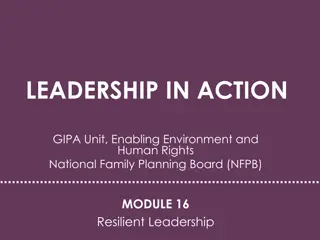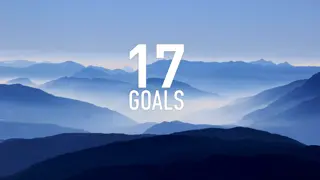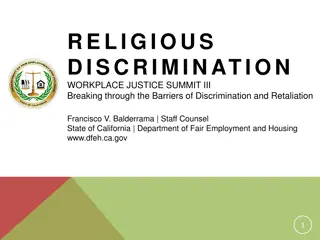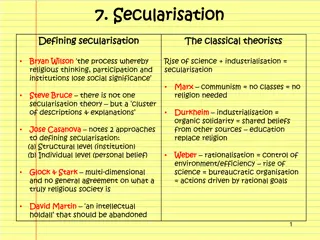Religious Institutes and Sustainable Development Goals
Religious institutes of men and women play a vital role in delivering the Sustainable Development Goals (SDGs). These institutes are actively engaged in addressing global poverty, humanitarian relief, climate change, and more. With a strong emphasis on partnership and shared humanity, they contribute to the implementation of the SDGs and advocate for a better world. Through their experience and commitment, religious congregations are champions of sustainable development, working towards a prosperous and peaceful future for all.
Uploaded on Mar 13, 2025 | 1 Views
Download Presentation

Please find below an Image/Link to download the presentation.
The content on the website is provided AS IS for your information and personal use only. It may not be sold, licensed, or shared on other websites without obtaining consent from the author.If you encounter any issues during the download, it is possible that the publisher has removed the file from their server.
You are allowed to download the files provided on this website for personal or commercial use, subject to the condition that they are used lawfully. All files are the property of their respective owners.
The content on the website is provided AS IS for your information and personal use only. It may not be sold, licensed, or shared on other websites without obtaining consent from the author.
E N D
Presentation Transcript
RELIGIOUS INSTITUTES OF MEN AND WOMEN AND SUSTAINABLE DEVELOPMENT GOALS (SDGs) DELIVERING AS ONE 1
SDGs what we know? What we are doing? What we can do together? and how
The world we have MORE THAN 65 MILLION PEOPLE ARE FORCED TO LEAVE THEIR HOME COUNTRIES AND WHERE 71 MILLION YOUNG PEOPLE ARE UNEMPLOYED 3
The World We Want In September 2015
Sustainable Development Goals: AGENDA 2030 The 2030 agenda is a plan of action for people, planet and prosperity, strengthening peace and requiring partnership for implementation. These five elements of sustainable development are all connected 5
Religious and Development Agenda Background The adoption of the Agenda was preceded by the address of His Holiness, Pope Francis in which he pledged to the organization the support of all the faithful in delivering the 17 goals of the Agenda The fight against global poverty and human suffering is both a moral and sacred imperative. Realizing the SDGs require a new partnership of all stakeholders, religious and secular alike, built on our shared humanity, and based on mutual respect and mutual benefit Religious as agents of development for centuries Feeding millions of people, caring for them through schools, hospitals, humanitarian relief, climate change, poverty or simply seeking to be a compassionate presence in a world, bring many religious congregations on board with legitimately impressive track records of care and organization. Many of these groups are project implementers or deliverers for international donors and agencies. Congregations of men and women religious were important actors in the implementation of the Millennium Development Goals (MDGs) The end of MDGs and post-2015 They had extensive experience in processes of the Sustainable Development Goals (SDGs) formulation through the Open Working Group, high level political negotiation process, indicators selection, and adoption of the Agenda 2030 They were part of different civil society partnerships with various operational UN and other international agencies in joint advocacy throughout these processes. They are not only advocates to influence governmental delegations that negotiated the SDGs; Also, religious communities have a non-tangible contribution to offer to broader spiritual aspects of developments. On the other hand, the SDGs could open new resources and connections for religious congregations, helping them tell their stories and do their work better. Catholic Sister: Champions of Sustainable Development in Africa. They came up with a common commitment to doing more on affordable and clean energy (goal 7), making environmental concerns as part of Thinking and living like a sister. 07/21/09
Collective Impact Delivering as One The enthusiasm about the SDGs is not evenly shared among and within the religious congregations A good number of religious men and women know little or nothing about the SDGs, while some deal with the Agenda with some degree of complacency. The paramount question is what is there for us? 8
The Project The Religious Institute of Men and Women and the SDGs: Delivering as One, as an initiative for ensuring the participation of our various groups in Nigerian in the SDGs process to provides to participants a strategic vision and practical knowledge based on the SDGs on how to find effective sustainable solutions for the communities they serve It will leverage on their long history of development activities to ensure that SGDs implementation starts with and within their congregations Duration SCOPE This project will be in two phases, organized in three regions according to the suitability of each congregation. The program will bring together representatives of religious men and women and their associates from across the country Phase 1: Learning and training workshop Phase 2: Ongoing follow up to assess the impact of the learning session on the activities of the groups as well projects embarked upon by the groups. This will last for the timeline of the SDGs (2030)
The Project Goals Expected Outcome See that the realization of the SDGs starts with and within their institutions To identify how many of them, if any, have systematic mechanism of development works Purpose Knowledge sharing basic information about SDGs and their interface with charisms, missions and apostolates of religious congregations To discuss the respective concerns, experiences and current milestones in the dynamics of religious congregations and development; Are able to develop a narrative based on their charism, spirit, mission and apostolate to communicate and implement the SDGs. Capacity building equipping members with necessary tools for implementing SDGs To consider opportunities to consolidate joint efforts towards calling for specific development priorities/goals. Are organized, coordinated and cooperate (with each other as well as with secular counterparts) through a focus on a few common themes or goals Networking introduce participants to basic elements and values of working together. To suggest thematic areas to look at including: poverty, environment/climate change, health, women s empowerment, governance Advocacy train participants on advocacy tools and develop advocacy strategies to guide the religious effective relationship with various levels of the Nigerian government implementing and monitoring the progress in the SDGs. Are determined to carry out advocacy with diverse governments, and to stand in solidarity with like-minded secular and rights-based counterparts in following the implementation and monitoring of the SDGs To create an informal network of development peers as advisors on religious and development dynamics (with a possibility of sub-networks focusing on specific thematic interventions/areas)
Thank you For more information contact, Emeka Xris Obiezu, OSA Augustinians International African Regional Office + 234-810-894-6706 emyxris@gmail.com Sr. Ngozi Frances Uti, HHCJ Center for Women Studies and Intervention (CWSI) srngozi42@hotmail.com; cwsinig@yahoo.com +234-803-670-0282 Sr. Amarachi Grace Ezeonu, SNDdeN Sisters of Notre Dame deNamur, Amarachi.Ezeonu@sndden.org +1-646- 683-6559 11
